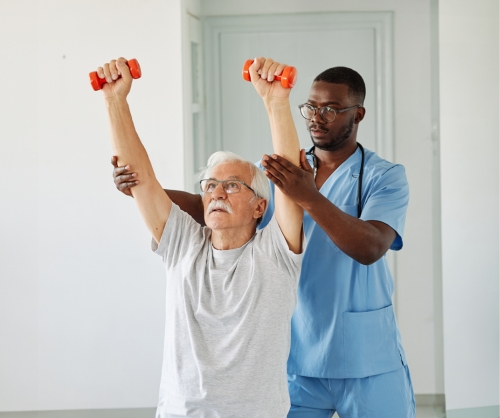 Recovery after a cardiac event takes time. Many physicians now recommend cardiopulmonary rehabilitation to support the process. A structured program, offered at skilled nursing facilities like West Hartford Health & Rehabilitation Center, helps patients gradually return to independent living while strengthening the heart to lower the risk of a heart attack, stroke and related complications.
Recovery after a cardiac event takes time. Many physicians now recommend cardiopulmonary rehabilitation to support the process. A structured program, offered at skilled nursing facilities like West Hartford Health & Rehabilitation Center, helps patients gradually return to independent living while strengthening the heart to lower the risk of a heart attack, stroke and related complications.
After your hospital stay, our short-term program is delivered over a short inpatient period, tailored to your medical needs. You’ll participate in supervised, exercise-based therapy with nutritional counseling, stress management strategies, lifestyle changes and preventive heart-health education.
What Is Cardiopulmonary Rehabilitation?
About 800,000 Americans experience a heart attack each year. For many, it’s their second or third event that greatly impacts quality of life.
Traditionally, patients who experienced a stroke, a heart attack or underwent heart surgery returned to their daily lives after hospitalization. However, doctors find that individuals who don’t make meaningful lifestyle changes often return with complaints of chest pain and fatigue. At West Hartford Health & Rehabilitation Center, we offer a cardiac rehabilitation program that focuses on:
- Gradually relearning to walk, move and manage activities of daily living.
- Healthy foods to eat and other ways to support your heart.
- Transitioning back home and maintaining an independent lifestyle.
When sustained, this form of treatment has been shown to reduce stroke incidents by as much as 60 percent, heart attacks by as much as one-third, and also has a positive impact on mental health.
What Can You Expect from Treatment?
Cardiac rehabilitation starts with an assessment for heart disease risks, often involving blood tests, a stress test and an EKG. The results tell your doctor the best way to proceed, both through short-term rehabilitation and long-term heart health goals.
Your treatment at West Hartford Health & Rehabilitation Center will progress through three phases:
- Phase One: Your care team examines your heart, blood vessels and overall physical health before discharging you from the hospital.
- Phase Two: Once you arrive, you’ll gradually increase physical activity levels and undergo routine heart assessments and preventative education. Treatment generally includes a combination of aerobic exercises and moderate strength training, along with guidance for a heart-healthy diet, minimizing stress, controlling your weight, managing existing medications, and smoking cessation.
- Phase Three: When you’re ready to transition home, we’ll provide a structured outpatient cardiac rehab plan and recommendations for daily exercise.
Conditions for Cardiac Rehabilitation
Cardiac rehab benefits a broad range of conditions affecting the heart and/or blood vessels, including:
- Heart attacks
- Heart failure
- Stable angina
- Using a ventricular assist device
- Heart and lung transplants
- Heart valve repairs and replacements
- Coronary artery bypass grafting
- Coronary artery angioplasty
- Heart disease
- Strokes
- Peripheral artery disease
- Blockages
- Cardiomyopathies
- Congenital heart diseases
- Stent surgery
What Are the Benefits of Cardiac Rehab?
Whether you have a job to return to, family members to care for, or important relationships to maintain, cardiac rehabilitation increases your strength so you can get back to enjoying a healthy lifestyle. Benefits of this treatment include:
- Lower rates of heart attacks, strokes and heart disease
- A stronger heart and healthier blood vessels
- Improved mobility around your home and community
- Less assistance needed with activities of daily living (ADLs)
- Practical strategies for managing stress, anxiety and related mental health concerns
- A personalized plan for healthy weight management
- Support to quit smoking
- Fewer incidents of chest pain and shortness of breath
- Longer life expectancy (up to five years) compared to no cardiac rehab
Has your doctor has recommended cardiac rehab following surgery or a recent cardiac event?
To learn more about our short-term rehabilitation services,
Contact Us Today




